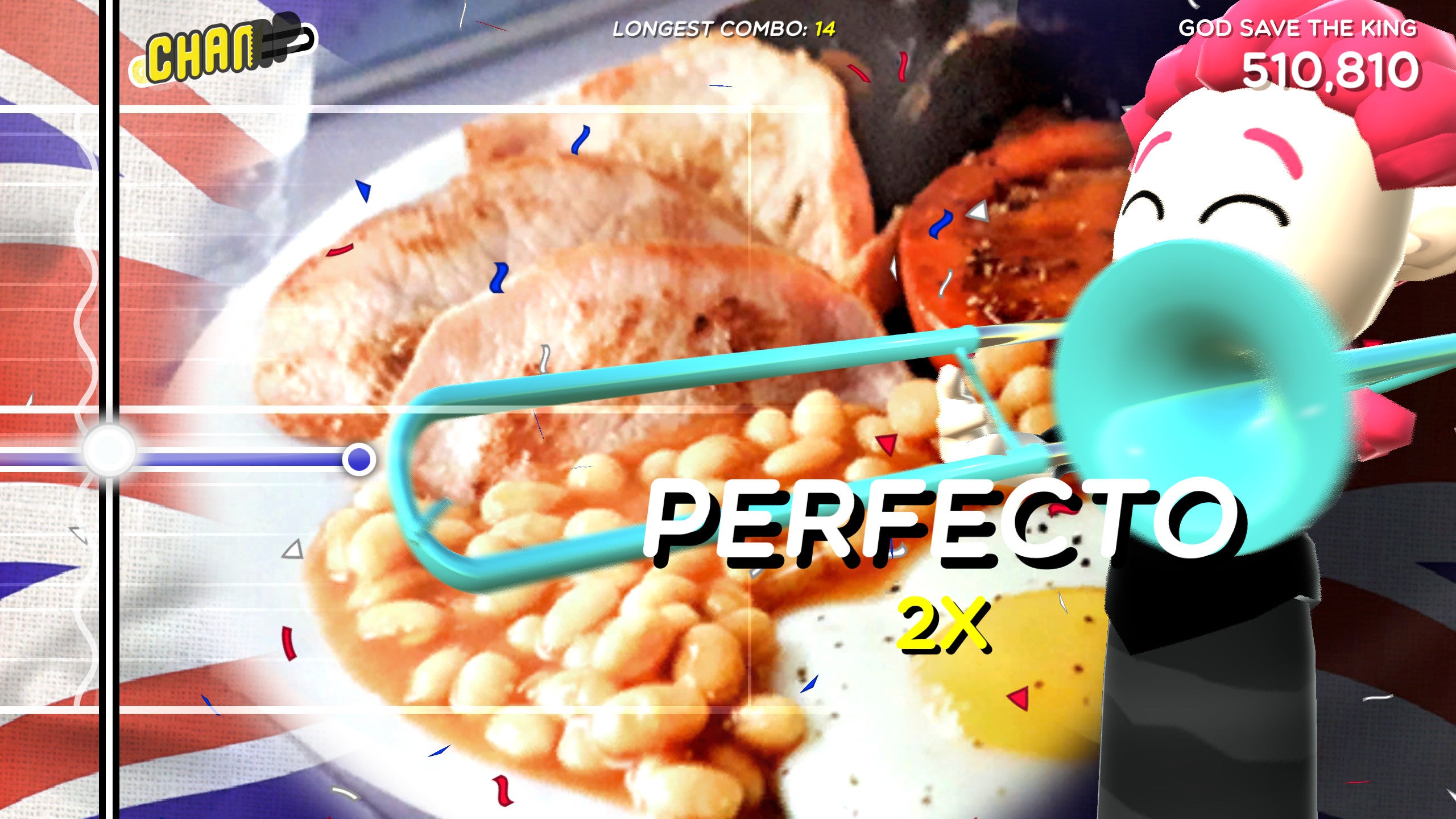Everyone’s talking about Trombone Champ. Not since Untitled Goose Game have I heard this much excited chat about a game from pals who don’t usually talk about games. This is because: 1) it’s a fun silly idea; 2) it’s very funny to miss a trombone note and squeal out a farty toot in the middle of Also Sprach Zarathustra. As I play Trombone Champ myself, I come to really appreciate that. It’s a rare rhythm game where playing badly doesn’t frustrate or berate me, because the worst-case scenario is making fart noises, and fart noises are funny.
Trombone Champ is a simple rhythm game. As notes scroll in along the timeline from the right, moving your mouse up and down changes the pitch of your trombone, and clicking or hitting a keyboard key blows it. So just try to do that well. The musical selection is mostly old public domain songs (including Skip To My Lou, O Canada, God Save The King, and a blast of Beethoven’s Fifth) with a few quirky fun original songs thrown in (one is named simply Baboons!, exclamation mark and all). It’s hard at first, and some songs stay hard, but that’s fine.
While Trombone Champ does take dexterity to master, especially on fast and complex songs, it broadly wants you to progress without becoming super frustrated. Even rubbish tooting scores pretty well because it is, at heart, a comedy game—and not just because of the farty noises). It opens with a cinematic cutscene parodying Dark Souls, and has a hidden story with secrets and mysteries and unlockables and baboons for you to discover. It awards your tooting with points to buy shiny trading cards of musicians and musical concepts (and a surprising number of hot dogs). Loading screens offer daft trombone facts. Daft animations play during songs. It wants you to discover silly things and laugh along the way.
Mistakes and failure are huge elements of most video games. Mood is heavily influenced by how you try to avoid mistakes, how failure makes you feel, and how you react to failure. Some games rile you into rising to the challenge. Some games want you pause and think about what went wrong. Some games are a cascade of mini-failures, each pushing you to react and recover or risk more complications raining down upon you. Some games will try to comfort you with a trickle of XP for your battle pass. Some games are split into such small portions that hey, don’t sweat it, just start over and try again. Some even just let you undo, no worries. While some rhythm games are gentler than others, I often find the genre can feel punitive in a way I don’t enjoy.

In games like Guitar Hero, fumbling a note can cause a wince-inducing stringslap or feedback shriek. Play badly and the crowd might boo, and if you play badly enough the game might end the song and kick you off stage. And many rhythm games are so focused on high scores, staggering challenges, or perfect play that small mistakes feel amplified. This is not the physical relationship I have with music, as a dancer so enthusiastic and reckless that I once broke my own nose dancing to Total Eclipse Of The Heart. So it’s great in Trombone Champ when I fumble a note then the game makes a silly noise and pushes me to tootle on without worry. I am delighted with the silly noise. The silly noise only makes me feel good.
It is, after all, very funny when something makes a fart noise.
I must warn that something about Trombone Champ feels completely wrong to my eyes, hands, and brain. Even after a lot of fiddling with mouse sensitivity and input latency in the settings menu, I can’t make timings feel right and my eyes start spinning within a few songs. Just like in life, I can only fart for so long before worrying something is really wrong. That’s certainly my excuse for the fart noises filling my office today.
